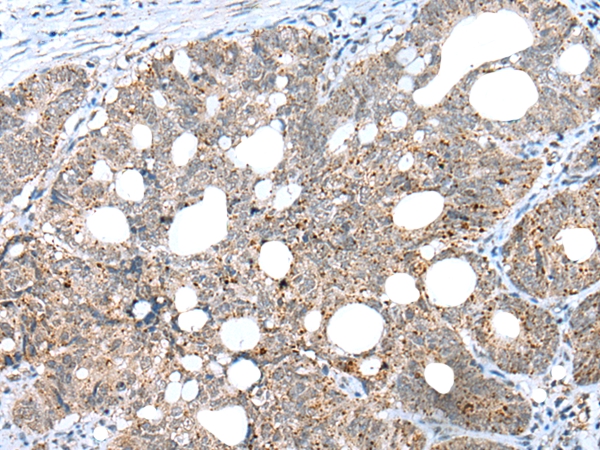
| WB | 咨询技术 | Human,Mouse,Rat |
| IF | 咨询技术 | Human,Mouse,Rat |
| IHC | 1/20-1/100 | Human,Mouse,Rat |
| ICC | 技术咨询 | Human,Mouse,Rat |
| FCM | 咨询技术 | Human,Mouse,Rat |
| Elisa | 咨询技术 | Human,Mouse,Rat |
| Aliases | CD299; LSIGN; CD209L; L-SIGN; DCSIGNR; HP10347; DC-SIGN2; DC-SIGNR |
| Entrez GeneID | 10332; |
| Host/Isotype | Rabbit IgG |
| Antibody Type | Primary antibody |
| Storage | Store at 4°C short term. Aliquot and store at -20°C long term. Avoid freeze/thaw cycles. |
| Species Reactivity | Human |
| Immunogen | Synthetic peptide of human CLEC4M |
| Formulation | Purified antibody in PBS with 0.05% sodium azide. |
+ +
以下是关于CLEC4M抗体的3篇参考文献及其简要摘要:
1. **"CLEC4M (L-SIGN) mediates binding and transmission of HIV by dendritic cells"**
- Granelli-Piperno, A. et al. (2007)
- 摘要:研究CLEC4M在树突状细胞中对HIV的捕获和传播作用,发现特异性抗体可阻断CLEC4M与HIV gp120的结合,抑制病毒传递至T细胞。
2. **"CLEC4M interacts with coronaviruses through spike protein binding"**
- Ng, M.L. et al. (2020)
- 摘要:证实CLEC4M通过结合冠状病毒刺突蛋白促进细胞感染,使用抗CLEC4M抗体可显著抑制病毒进入,提示其在抗病毒治疗中的潜在应用。
3. **"Genetic variation in CLEC4M modulates immune response to pathogens"**
- Barreiro, L.B. et al. (2008)
- 摘要:通过抗体检测CLEC4M在不同人群中的表达差异,发现其基因多态性与对HIV、结核等病原体的易感性相关,影响免疫应答强度。
4. **"CLEC4M mediates adhesion of liver sinusoidal endothelial cells to lymphocytes"**
- Zhang, Y. et al. (2010)
- 摘要:利用CLEC4M抗体研究其在肝窦内皮细胞的黏附功能,发现其通过结合ICAM-3调控淋巴细胞归巢,影响肝脏免疫微环境。
这些研究展示了CLEC4M抗体在病毒机制、宿主遗传及免疫调节研究中的关键作用。
The CLEC4M antibody targets the C-type lectin domain family 4 member M (CLEC4M), also known as L-SIGN, CD299. or CD209L. CLEC4M is a transmembrane receptor belonging to the C-type lectin superfamily, which plays critical roles in pathogen recognition and immune modulation. It is primarily expressed on endothelial cells in lymph nodes, liver, and placental tissues, as well as on specific subsets of immune cells. Structurally, CLEC4M contains a carbohydrate recognition domain (CRD) that binds high-mannose and fucose-containing glycans on viral, bacterial, and fungal pathogens, facilitating pathogen uptake and immune activation.
CLEC4M interacts with pathogens such as HIV, Ebola, SARS-CoV-1. and hepatitis C virus, acting as an attachment receptor or entry cofactor. It also mediates immune tolerance by modulating T-cell responses and promoting antigen presentation to dendritic cells. Research on CLEC4M antibodies focuses on elucidating its dual role in host defense and immune regulation. These antibodies are used to block CLEC4M-pathogen interactions, study its signaling pathways, or detect its expression in tissues during infections, cancer, or autoimmune diseases. Polymorphisms in CLEC4M are linked to altered susceptibility to infectious diseases, making it a potential therapeutic target. CLEC4M antibodies thus serve as vital tools in understanding immune evasion mechanisms and developing antiviral or immunomodulatory strategies.
×